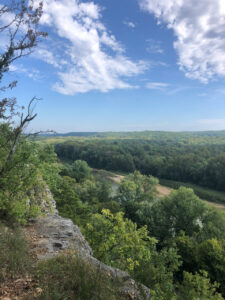
River Scene Trail, Castlewood State Park, MO. Photo by John Griswold
Sometimes when you feel the weight of everything—all those space rocks grinding away senselessly, nebulae billowing, nuclear fires ejecting plasma, the oppressive silence of your own existence building on some little planet of a Sunday afternoon to the realization that buying that eggplant on a whim at the supermarket on Thursday created a responsibility to the fruit, and now there is the need to go back for zucchini, tomatoes, and basil to keep it company in a stew—it is best to just go for a hike.
St. Louis is an excellent place to get moving outdoors, and there are always surprises in store. Growing up nearby, I never thought of St. Louis as a western city; in my imagination its significance was on the North-South axis. But the start of the historical West is the mouth of the Missouri River, which empties into the Mississippi a few miles above St. Louis and served as a gateway to western colonization. Until 1984 the US Census Bureau called all this part of the country, including the Dakotas and Nebraska, the North Central Region, which makes more sense to me than “Midwest.” Get more than 20 miles west of the Arch, out where the Missouri curls around the edges of the metropolitan area, and a more western landscape emerges.
One of the first points of contact for this is Castlewood State Park, which lies along both sides of the Meramec River for five miles. The landscape’s steepness and beauty rise incongruently from the strip malls and big-box stores; the narrow entrance road’s ups and downs confused my car’s engine and transmission and kept it in full whine. From just before Prohibition until WWII, the area of the park was a Catskills-style resort on the upper Ozark plateau, called Lincoln Beach. All but a foundation and some concrete stairs are gone.
A large sign by the park office park said the park might close periodically through the day due to high usage, but I took the most popular trail and passed only a few people on the 3.5 mile loop. I chose the trail for its variety: upland bluffs covered in a scree of limestone, dolomite, and quartz that made it necessary to watch your feet as you walked; deep ravines with dark, damp woods; and packed-sand trails along the river’s floodplain, interrupted by enormous living sycamores and driftwood trunks. Little red plastic squares were pinned to trees, only where needed, to show the way. Just breathe, someone had written in Sharpie on one.
Bright red sumac leaves are the first to fall in the new season, and cricket frogs chirped. The river was milky from limestone, and rain droplets made circles on its surface as it slid by slowly. The void is at least honest in nature, revealing the world wearing down in geological time, the squirrel chattering at a bird in the berries in mammal time. The smell of creosote gave away the tracks of the Union Pacific at the base of the bluffs, and an Amtrak liner flew past. My cotton T-shirt stuck to me from humidity more than exertion.
Coming off the trailhead you think, That’s my car; it’s going to take me home, where I’ll have a hot shower, put on dry clothes, and make a good meal and share it with someone. Later you’ll sink into bed with a touch of fatigue and an unread book and realize that something as simple as all this has brought you back to the world, where distance is as strange as time, unknowable really.
